Why Opposition to Ahmadiyya Islam Proves its Truth
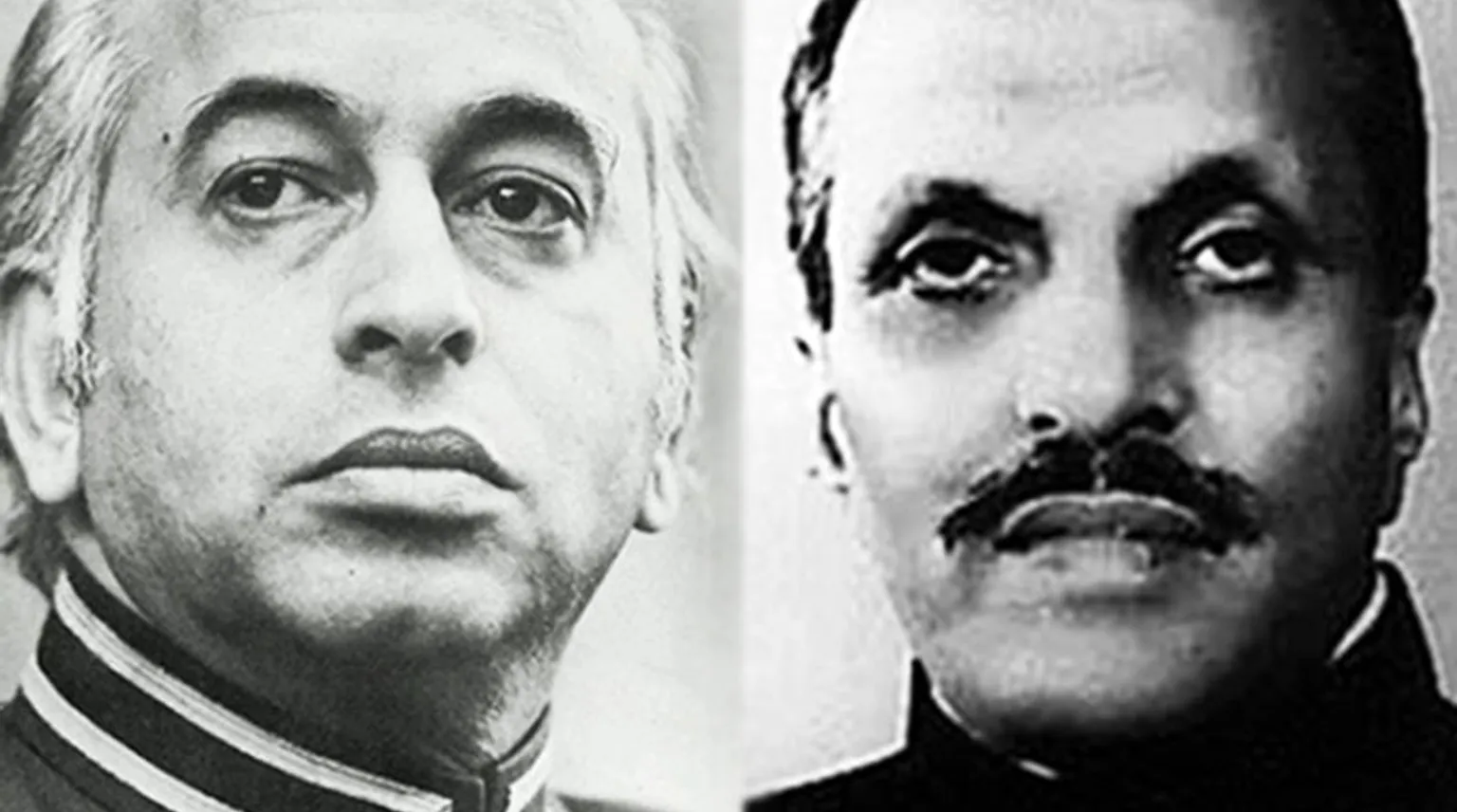
By Missionary Usman Shahzad Butt
Introduction to Ahmadiyya Islam
Having declared Ahmadis as “non-Muslim”, the collective leaders of non-Ahmadi Muslim sects, such as those of Sunni and Shia, have brought to bear immense opposition against the Ahmadiyya Movement in Islam. Though every sect in Islam opposes another in some shape or form, the one thing that has united them and made allies of enemies, is their opposition towards the Ahmadiyya Muslim community and the claims of Hazrat Mirza Ghulam Ahmad (as). We’ve written extensively about him on this website, here, here and here.
This opposition doesn’t stop at Muslims; scholars who belong to different religious groups have also stood in opposition to the Ahmadiyya Muslim community, united. This begs the question: does opposition to Ahmadiyya Islam prove Hazrat Mirza Ghulam Ahmad (as) false? Does the so-called “consensus” mean Ahmadiyya Islam can be summarily dismissed without a second thought?
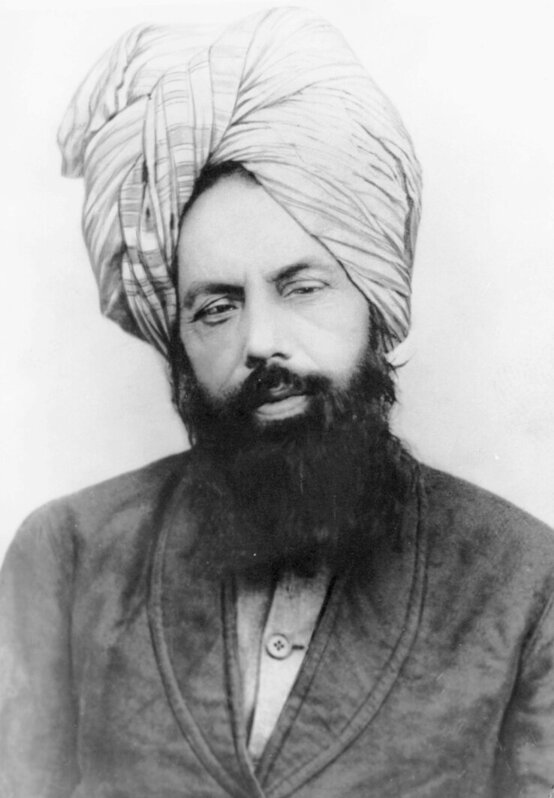
Verdict of the Quran
In the Holy Quran, God Almighty states:
“Alas for My servants! there comes not a Messenger to them but they mock at him.”
Holy Quran 36:31
“And thus has it always been that We never sent any Warner before thee to any township but the evil leaders thereof said: ‘We found our fathers following a certain course, and we are following in their footsteps.’”
Holy Quran 43:24
“Thus did We make for every Prophet an enemy from among the sinners; and sufficient is thy Lord as a Guide and a Helper.”
Holy Quran 25:32
These verses very clearly state that every prophet that has been sent by God Almighty has faced opposition and enmity. In fact, one could say that according to these verses, and after studying the lives of all previous prophets, fierce opposition and intense hostility is a common factor in the lives of all of them.
The Holy Quran has further stipulated this point when it describes the circumstances prior to the advent of a prophet, especially that of the Prophet Muhammad (sa), in the following verse of the Holy Quran:
“Corruption has appeared on land and sea because of what men’s hands have wrought, that He may make them taste the fruit of some of their doings, so that they may turn back from evil.”
Holy Quran 30:42
Islamic commentators have explained this verse in the following manner: the “land” refers to those people who do not adhere or follow any religion, while the sea refers to those people who follow a divinely revealed teaching, but whose clergy and religious leaders have also succumbed to disorder and corruption. Thus the era of a prophet cries out for a saviour to bring everyone from darkness into light.
How God Destroys False Prophets
God states further in the Holy Quran:
“And if he had forged and attributed any sayings to Us, We would surely have seized him by the right hand, And then surely We would have severed his life-artery, And not one of you could have held Us off from him.”
Holy Quran 69:47-9
This is a powerful declaration stating that even if the Prophet Muhammad (sa) himself, God’s most beloved servant, had attributed to God any false statement, God would have cut his life-artery and destroyed him. If this is the case with God’s most beloved servant, then imagine how God would treat others who lie in His Holy Name? God would most certainly destroy that person and their movement.
Thus, if a person falsely claims revelation from God, claiming he is commissioned as God’s representative, then God Almighty, the All Knowing and the Most Powerful, will not allow him to succeed and carry on, but will utterly destroy him, and no one would be able to keep God from punishing such a person.
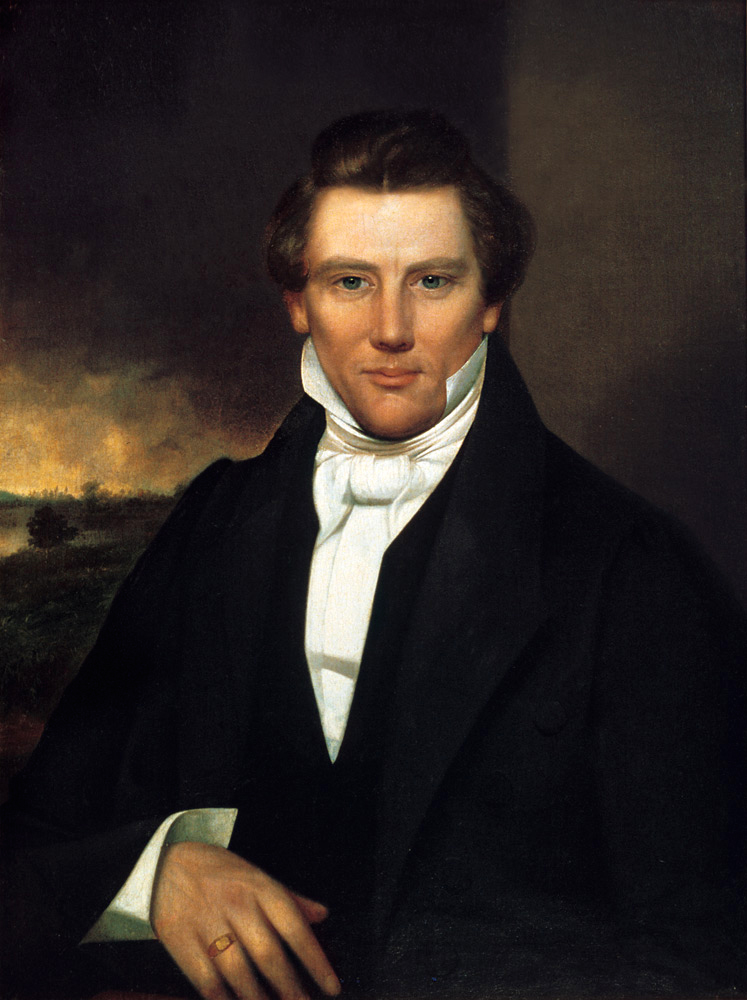
This has been seen in the case of many claimants of Prophethood. Bab, the founder of the Baha’i religion, was executed at the age of 31. Joseph Smith, founder of Mormonism, another false claimant of revelation, was similarly executed, shot in the back as he tried to escape from prison. Hong Xiuquan, claimant to a form of Messiahship, died of poisoning and possible suicide in 1864. In more recent history, Rashad Khalifa, who claimed to receive revelation from God and commission from God, was assassinated in 1990. This is a consistent theme of history.
In respect of Mirza Ghulam Ahmad (as), though, no such event can be found. He died at an old age of natural causes in his seventies (1908), more than twenty five years after first claiming revelation (1882) as published in his magnificent book, Barahin-e-Ahmadiyya Part III.
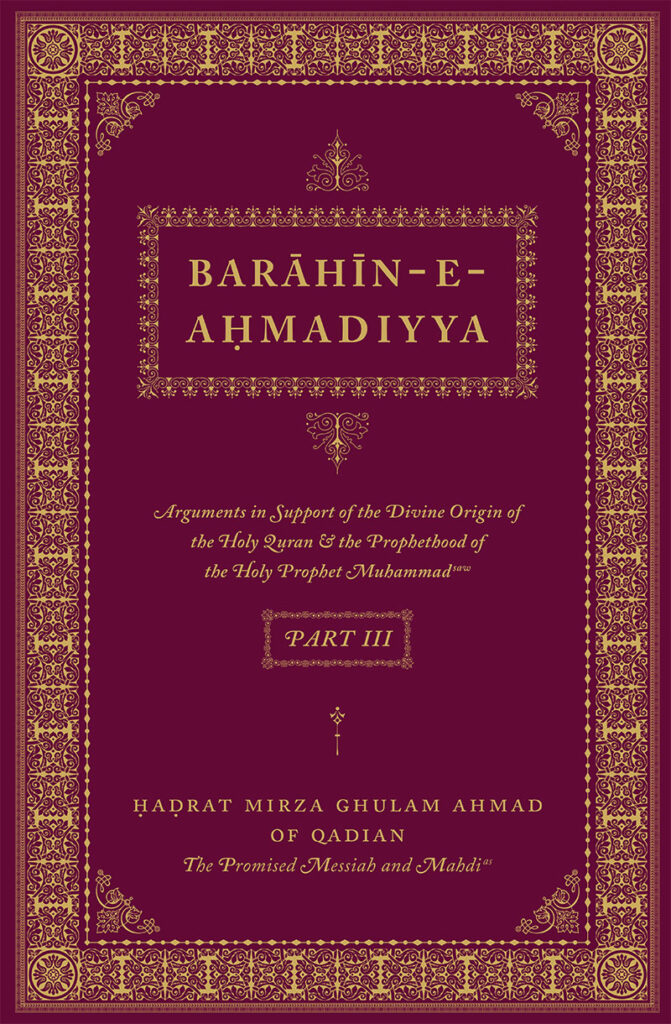
So much for his person, but what of his message? Did God destroy it or cause it to flourish, in the face of all opposition? Common sense will tell you that if opposition halts your progression, then something must be wrong and if that was the case then you could question the authenticity of the claim of the claimant. However, if opposition has had the opposite effect, with the claimant and his movement reaching new heights, with his community growing from strength to strength, despite opposition, then one can know that this is a movement from Allah. So what does the record show on this question?
In 1889 Hazrat Mirza Ghulam Ahmad (as) established the community and claimed to be the long awaited Mahdi and Messiah. This all took place in the small town of Qadian in India, which is a town that the average person has not heard of till this day. More than 100 years later, the community has flourished, fulfilling the prophecy given to the Promised Messiah (as) that ‘I shall spread thy message to the corners of the earth’. And we see today that the community has been established in over 200 countries across the world and has tens of millions of followers.
Looking at these figures and taking a deeper look into how the community has spread, it is clear that God almighty has not only blessed the community but has provided every means for the community to spread its message to mankind, enabling the 5th Khalifa of the Promised Messiah (as) to convey the message of Islam at Capitol Hill, the British Parliament, the European Parliament, before African World Leaders, and to Dutch and German leaders. Even when opposition has been at its fiercest, the community has been able to overcome it and come out stronger and carry on the mission of the Promised Messiah (as), all through the sheer grace and aid of God Almighty. Till this day no opponent of the Ahmadiyya Muslim community has been able to refute the argument stated above.
Verdict of Hadith
In the time of the Prophet Muhammad (sa), the leader of those who opposed him came to be known by the epithet of “Abu Jahl”, meaning “The Father of Ignorance”. He was not always known as such, however. Indeed, in pre-Islamic times, he was known as “Abul-Hakam” meaning “The Father of Wisdom”. Yet this man, who was considered an ‘alim or scholar of the pre-Islamic Arabs, was the foremost enemy of the Prophet Muhammad (sa) and was indeed, termed by the Prophet Muhammad (sa) as the likeness of Pharaoh.
The coming of the Imam Mahdi and Promised Messiah was to be no different. Speaking on the condition of the Muslim leaders at the time of the coming of the latter days, Hazrat Ali (ra) narrates that the Holy Prophet (sa) stated:
“A time will come in the near future when there will be nothing left of Islam except its name. And there will be nothing left of the Holy Qur’an except its words [meaning the Holy Qur’an would not be understood and followed]. The mosques of that age will apparently be full of people, but will be empty of righteousness. Their ulema will be the worst creatures under heaven. Discord will rise from them and will come right back to them. [That is, these ulema will be the source of all evils.]
Al-Baihaqi as quoted in al-Mishkat Kitab-ul ‘Ilm, chapter 3, p. 38 and Kanzul ‘Ummal, chapter 6, p. 43
The question that naturally arises out of this picture is whether at this time, if a spiritual reformer comes, can it be expected that a misguided, corrupted religious class would accept him? Would they be willing to submit their religious authority to someone who has been appointed by God? Has it ever happened that a degenerate religious clergy submitted to the God-given authority of a prophet of God?
Indeed, we have what happened to Jesus (as), directly before our eyes, and this is the case in point that the Prophet Muhammad (sa) also drew our attention to, as a prophecy for the future of his Ummah. He foretold opposition towards the Promised Messiah (as) and his community, just as Jesus (as) was opposed by the Ulema – the Pharisees and Sadducees of his day.. Abdullah bin Amar (ra) relates that the Holy Prophet (sa) said:
“What befell the children of Isra’il will befall my Ummah, step by step, such that if there was one who had intercourse with his mother in the open, then there would be someone from my Ummah who would do that. Indeed the children of Isra’il split into seventy-two sects, and my Ummah will split into seventy-three sects. All of them are in the Fire except one sect.” He said: “And which is it O Messenger of Allah?” He said: “Those in my condition and the condition of my companions.”
Sunan al-Tirmidhi 2641
This narration begins by stating that the sins of the Muslims would be identical to the sins of the Israelites of the past. What was the greatest crime of the Israelites, according to the Quran? Was it not rejection of Jesus (as)? If the greatest crime of the Israelites was the rejection of the Messiah sent to them, and the Prophet Muhammad (sa) warns the Muslims that their sins would be the same, then how could it be that the Muslims would not follow the same path?
Further, it is clear to see from this narration that there would be division amongst the Muslim body and the only true community would be that which is on the condition of the Holy Prophet (sa) and his companions. What was that condition? If we look at the life of the Holy Prophet (sa), we find that he faced fierce opposition throughout his prophethood and so did his companions, however this opposition came to naught and today the Holy Prophet (sa) is known to be the most influential person in history.
If we look at all the sects of Islam, we find that it is only the Ahmadiyya Muslim community that fullfills the words of the Holy Prophet (sa) with regards to resembling him and his companions. It is only Ahmadis who are barred from Salat; only Ahmadis are prevented from reading the Kalima; only Ahmadis are banned from reading the Quran; only Ahmadis are banned from building mosques; only Ahmadis are persecuted and driven from their homes for belief in Allah’s unity and Muhammad’s (sa) Messengership; only Ahmadis are banned from calling themselves Muslims, as the companions of the Holy Prophet (sa) were forced by the Meccans to call themselves Sabi instead of Muslim. Every condition faced by the early Muslims is today faced by Ahmadis, and by Ahmadis alone in the history of Islam. This is admitted by anti-Ahmadi Sunni Scholars themselves! Many have been persecuted in Islamic history for leaving the faith; none have ever been persecuted for identifying as Muslim. This honour belongs to Ahmadis alone, along with the early companions of Islam.
How Did God Treat Mirza Ghulam Ahmad?
1974 was a historic year in the history of Pakistan. All 72 sects within Islam gathered in the National Assembly of Pakistan and united in declaring Ahmadis to be non-Muslims in the eyes of the law. In a news report published in Pakistan by the Daily “Nawai Waqt” on the 16th of October 1974, it was mentioned that the “Qadiani issue” had been resolved, as for the first time in Islamic history there has been a consensus that Ahmadis are not to be considered as Muslims. This reference to all 72 sects declaring the one Ahmadiyya community to be outside the pale of Islam, was then reported in Western outlets too:

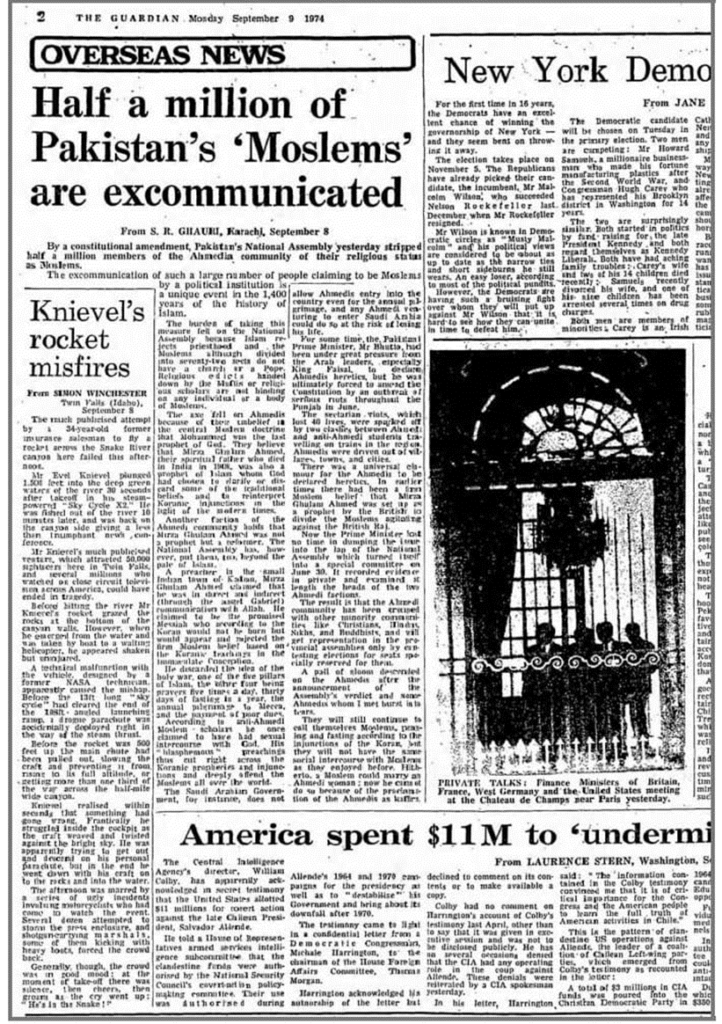
By declaring this, the blessed words of the Holy Prophet (sa) have been remarkably fulfilled and it has become easy to identify that the Ahmadiyya community is that one community which the Holy Prophet (sa) has referred to in the narration above as being truthful.
Moreover, the idea that this declaration was based on a consensus of the entire Ummah defies logic and does not make for a rational argument. This is due to the simple fact that Ahmadis declare themselves to be Muslims and consider themselves to be part of the Ummah. If Ahmadis are true in this, then how can there have been consensus in declaring them as non-Muslim, when Ahmadis do not accept this decision, and continue to regard themselves as Muslim? Therefore it is clear that this decision was based not on consensus but on the hate-filled views of the 72 sects towards the Ahmadiyya community, leading them to falsely declare this decision a consensus.
Conclusion
It is clear to see in history that many prophets have come and gone and the one thing that differentiates a true prophet from false claimants is that false prophets may be seen as welcomed by people but are rejected by God, and are ultimately destroyed by God Himself.
On the contrary all true prophets face heavy opposition, despite which they always succeed in fulfilling their mission through divine support and guidance. Hazrat Mirza Ghulam Ahmad (as) is a perfect example of the latter. Born in a small village of India no one knew the name of and facing severe opposition from all other sects of the Ummah, yet more than 100 years after his claim, the Ahmadiyya Muslim community has spread to the corners of the earth and will continue to flourish and prosper.
More articles
Contact
National Outreach Department:181 London Rd, Morden SM4 5PT, U.K.
Email: [email protected]Phone: 0208 6877804
@ 2025 Ahmadiyya Muslim Community, All Rights Reserved.